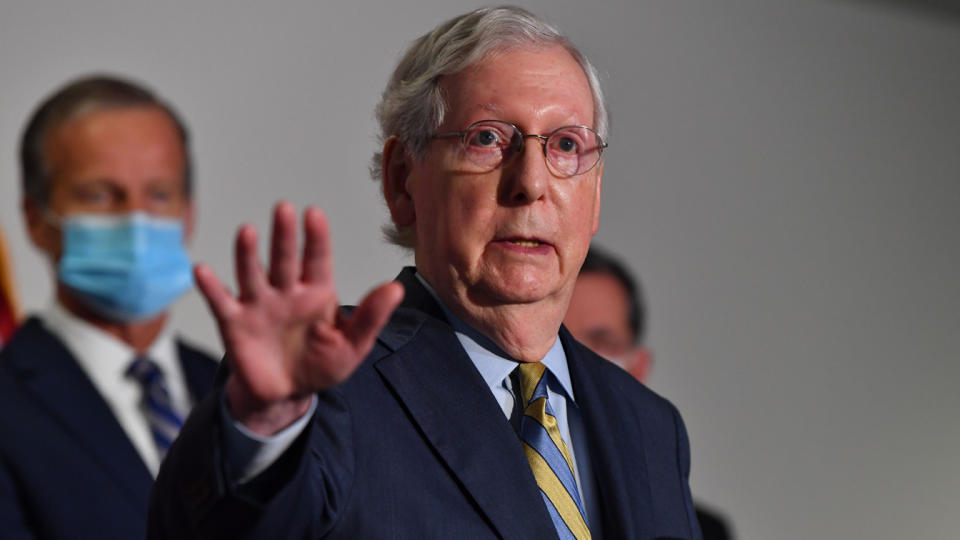McConnell told Trump he thinks Barrett is best Supreme Court pick
Senate Majority Leader Mitch McConnell told President Trump last weekend that he thinks Judge Amy Coney Barrett is the strongest choice among several to replace the late Supreme Court Justice Ruth Bader Ginsburg, but that he would support any of the president’s top few choices.
McConnell, a Republican from Kentucky, relayed this advice in a phone call, a GOP consultant familiar with the conversation told Yahoo News.
Trump met with Barrett at the White House on Monday, and has said he will announce his nomination on Saturday. That will commence the process of the Senate beginning its consideration of the nominee.

Republicans appear poised to barrel ahead with a rushed confirmation process as they almost certainly have enough votes to confirm a replacement before the Nov. 3 presidential election. The announcement Tuesday by Sen. Mitt Romney, R-Utah, that he supports a vote before the election dashed any slim hopes for Democrats that they could delay a vote until after the election.
The only suspense remaining now lies in who Trump will pick and whether any salient concerns could emerge about the person that the president puts forward.
Barrett is an appealing choice for Republicans for a few reasons. She is clearly conservative, and a devout Catholic.
In fact, her faith background will be a large factor in the public debate if she is Trump’s choice. Barrett, who is a mother of seven and is married to a former federal prosecutor, has been deeply influenced by the People of Praise faith community in South Bend, Ind., which is known for its spiritual intensity and intellectual rigor.
But People of Praise has taught that women must “obey” their husbands, according to a former member of the group. It’s elements like these in Barrett’s faith background that have already attracted criticism and scrutiny. In 2017, when Barrett was appointed to the U.S. Court of Appeals Seventh Circuit, Sen. Dianne Feinstein, D-Calif., made the now-famous remark to Barrett that “when you read your speeches, the conclusion one draws is that the dogma lives loudly within you, and that’s of concern when you come to big issues that large numbers of people have fought for years in this country.”
Barrett’s fairly contentious confirmation process in 2017 is part of the appeal for her to be picked for the Supreme Court because she has been pressure-tested in a high-profile setting, unlike the other potential choices.
And Democratic criticisms and questions about Barrett’s faith background could be framed as attacks on religion by Republicans and used to energize their voters in the fall election.

The smart play for Democrats, the Republican consultant said, would be to keep raising massive amounts of money with which to overwhelm Republican candidates in the home stretch of the 2020 campaign, make measured and principled criticisms of McConnell and Trump, and “don’t treat Amy Barrett like some villain from a Dan Brown novel.”
As the initial shock of Ginsburg’s death has worn off, Democrats have become less alarmed than they were initially about the electoral impact of Ginsburg’s vacancy. “People are so deeply engaged it may not have the impact we thought at first,” said one senior adviser to a Democratic senator.
In addition, the notion of restraint has become more attractive, whether that’s in response to the Republicans’ plans to jam a nominee through six weeks before an election after blocking a nominee nine months before the last, or whether it’s in how they approach Trump’s nominee.
Senate Minority Leader Chuck Schumer, D-N.Y., over the weekend made comments that nodded to the more confrontational elements inside the Democratic Party, saying on a Saturday phone call with Democratic senators that if Republicans held a vote this year, then “nothing is off the table for next year.”
That was a clear reference to calls for Democrats to threaten Republicans with escalatory actions of their own when it comes to judges and the Supreme Court. Sen. Ed Markey, D-Mass., tweeted the night that news broke of Ginsburg’s death that if McConnell tried to confirm a replacement before the election then “when Democrats control the Senate in the next Congress, we must abolish the filibuster and expand the Supreme Court.”

But since Saturday, Schumer has said nothing more about this type of retaliation, following the lead of Democratic presidential nominee Joe Biden, who has pointedly avoided such rhetoric.
The Democratic adviser pointed out one obvious reason to avoid public promises of revenge. “We don’t want to be talking about the court and retribution before we even win [control of the Senate and the presidency,” the Democrat said. “So if we lose, we just handed Mitch McConnell two more seats on the Supreme Court. Why wouldn’t they pack the court at that point?”
In addition, the politics of getting moderate Democrats to go along with breaking Senate norms are more difficult than the average activist grasps. Those would be very difficult votes to take for Democrats in conservative or swing states, and it would severely limit the ability of those lawmakers to cast tough votes on other issues that would be high priorities in a Biden administration, such as climate change, restoring the Voting Rights Act or expanding health care coverage.
Health care, in fact, is where the Biden campaign wants the nation to focus during the confirmation fight. They have said they are “regularly coordinating” with Democrats in Congress to message that the court fight “underscores the stakes of the election more than ever.”
_____
Read more from Yahoo News:

 Yahoo News
Yahoo News 


